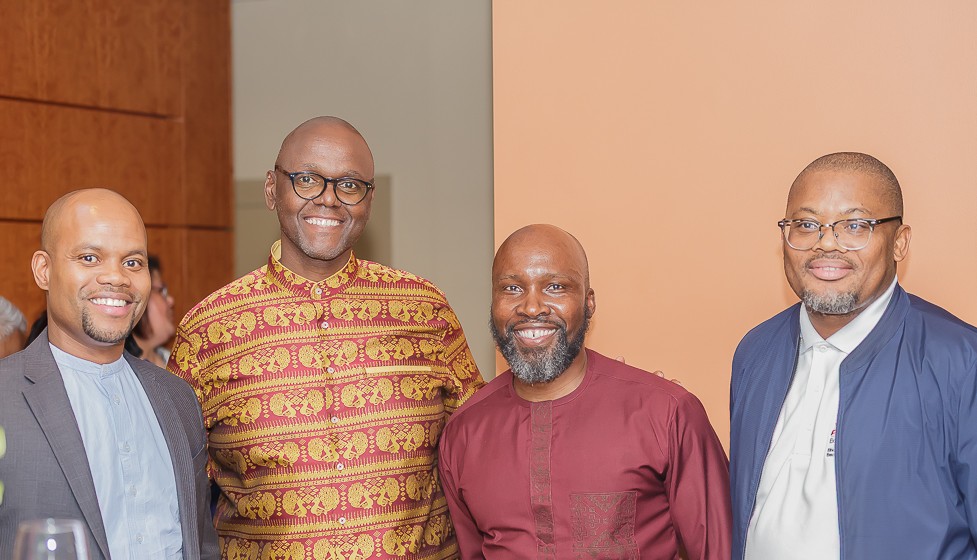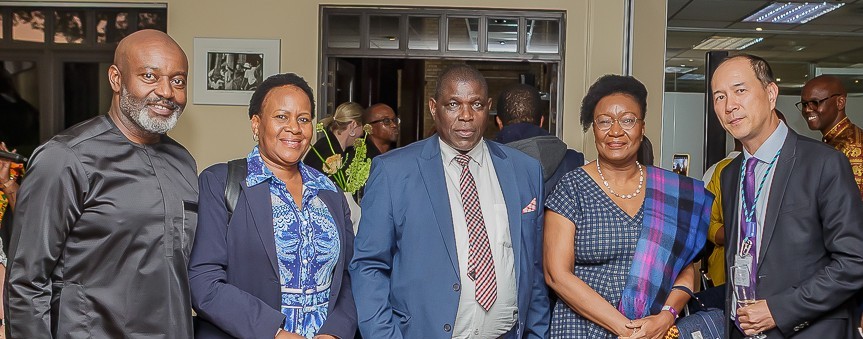Sitting: Christine Muhigana (UNICEF), Professor Olive Shisana, Minister of Health Dr Aaron
MotsoaledI, Yu Yu (UNFPA). Standing: Irfan Akhtar (UNICEF) and Ziyanda Ngoma (UNFPA)
South Africa is standing at a demographic crossroads. According to Statistics South Africa’s 2024 Mid-Year Population Estimates, the population under the age of 35 is approximately 36.5 million, representing about 58% of the total population of 63.02 million. The country, therefore, possesses a powerful engine for socio-economic transformation: its young people..
But this engine must be fuelled—through investments in health, education, gender equality, and decent work opportunities—to unlock the demographic dividend and advance inclusive development.
The demographic dividend refers to the economic growth potential that results from shifts in a country’s age structure, particularly when the working-age population is larger than the non-working-age groups. South Africa is uniquely positioned to reap this dividend, but the opportunity is time-bound and contingent on deliberate, coordinated policy actions and investments.
 Dr. Mbongiseni Buthelezi (Nelson Mandela Foundation), Vincent Magwenya (Presidency), Thulani Mbatha (UNFPA) and Busani Ngcaweni (National School of Government).
Dr. Mbongiseni Buthelezi (Nelson Mandela Foundation), Vincent Magwenya (Presidency), Thulani Mbatha (UNFPA) and Busani Ngcaweni (National School of Government).
Realizing the Promise of the Demographic Dividend
While South Africa has made progress in expanding access to education and basic services, many young people—especially those in rural and under-resourced communities—face persistent barriers that hinder their ability to thrive. High youth unemployment, low levels of foundational literacy and numeracy, early and unintended pregnancies, and entrenched gender inequalities are just a few of the challenges standing in the way of realizing the demographic dividend.
To address this, the Government of South Africa, together with all stakeholders, must adopt an integrated approach to human capital development—starting from early childhood through adolescence and into young adulthood.
“Harnessing the demographic dividend is not automatic. It requires bold, coherent action across sectors—education, health, social development, and the economy. We must all be rowing in the same direction,”
— Mr. Yu Yu, United Nations Population Fund (UNFPA) Representative
Investing in Health and Rights
Health is the bedrock of human capital. Yet adolescent girls in South Africa remain at high risk of early and unintended pregnancy, sexually transmitted infections including HIV, and gender-based violence. These realities significantly reduce girls’ chances of completing school and participating fully in the economy.
The United Nations Population Fund (UNFPA) supports the government in scaling up access to adolescent and youth-friendly sexual and reproductive health services, strengthening school health programmes, and expanding comprehensive sexuality education. Supporting these efforts, the United Nations Children’s Fund (UNICEF) continues to champion community health systems that provide early childhood health and nutrition interventions, especially among marginalised communities..
These are not just health interventions—they are economic strategies. A healthy population is more productive, resilient, and able to contribute to national development.
 Nelson Muffuh, UN Resident Coordinator, Kefiloe Masiteng, Head of UN Resident Coordinator’s Office, Peter
Nelson Muffuh, UN Resident Coordinator, Kefiloe Masiteng, Head of UN Resident Coordinator’s Office, Peter
Netshipale, Director General Department of Social Development, Lydia Zigomo, UNFPA Regional Director and Yu
Yu, UNFPA Representative.
Quality Education and Skills for a Changing World
It is notable that South Africa’s education system has achieved near-universal enrolment at primary level. However, significant challenges remain with learning outcomes. The 2021 Progress in International Reading Literacy Study (PIRLS) revealed that 81% of Grade 4 learners cannot read for meaning in any language.
Addressing this foundational crisis is essential, therefore UNICEF is working with the Department of Basic Education and partners to strengthen early grade reading programmes, teacher development, and school readiness initiatives. Equally important is ensuring that learner’s transition successfully into secondary education and acquire the digital, entrepreneurial, and life skills needed for the future world of work, hence this remains a key priority.
“Education is not just about preparing our children for exams—it’s about preparing them for life, for innovation, and for civic engagement. Every child who learns is a child who leads,”
— Ms. Christine Muhigana, UNICEF Representative
Economic Empowerment and Youth Employment
According to Statistics South Africa’s Quarterly Labour Force Survey for the fourth quarter of 2024, approximately 3.5 million young people aged 15–24 years were not in employment, education, or training (NEET). This not only limits the country’s growth potential but also increases vulnerability to poverty, violence, and social exclusion.
Creating pathways to economic participation for young people is crucial. This includes investments in Technical and Vocational Education and Training (TVET), support for youth entrepreneurship, and partnerships with the private sector to align training with market demand.
Advancing Gender Equality and Social Inclusion
Gender-based violence, child marriage, and deeply ingrained social norms continue to hinder the development of girls and women in South Africa. True demographic and economic transformation cannot occur without addressing these issues head-on.
UNFPA supports government initiatives such as the Sanitary Dignity Programme and the implementation of the National Strategic Plan on Gender-Based Violence and Femicide, and implements social and behaviour change communication programmes that empower adolescent girls and boys to challenge harmful norms and build respectful relationships.
In addressing these concerns, UNICEF emphasises that a whole-of-society approach be taken, because government alone cannot achieve the scale of transformation required. Every sector, every citizen has a role to play.
Better Data, Stronger Governance, and Integrated Partnerships
Effective planning and monitoring require accurate, disaggregated data that tells the full story of young people’s realities. The 2022 Census and ongoing data collaboration through the National Population Unit, Statistics South Africa, and development agencies provide the evidence base needed to guide targeted investments in youth and children.
In our collective quest to achieve the Sustainable Development Goals,, coordination across government departments, the private sector , civil society, and development partners is essential. Human capital development is not a single programme—it is a national agenda that must be embedded in South Africa’s development frameworks, including the National Development Plan, the Integrated Youth Development Strategy, the National Programme of Action for Children and the National Strategy to Accelerate Action for Children (NSAAC).
A Call to Action
South Africa’s window to harness the demographic dividend is narrowing. If we act decisively—ensuring that health, education, protection, and economic inclusion are guaranteed for all children and youth—we can build a future that is more equitable, productive, and united.
“Young people in South Africa represent our greatest hope for a prosperous and inclusive future. But this hope must be nurtured through visionary leadership and sustained investment in human capital,”
— Mr. Nelson Muffuh, United Nations Resident Coordinator in South Africa
If we do not act now, we risk losing a generation to poverty, unemployment, and inequality. But if we do act—strategically, inclusively, and with urgency—we can build a nation that is more prosperous, equitable, and resilient.
UNICEF and UNFPA reaffirm their commitment to supporting South Africa’s child and youth agenda, to ensure that every child and young person has the opportunity to fulfil their potential. Let us invest in our youth—not just as beneficiaries of development, but as architects of our future.
The time to invest in human capital is now. The dividend awaits!